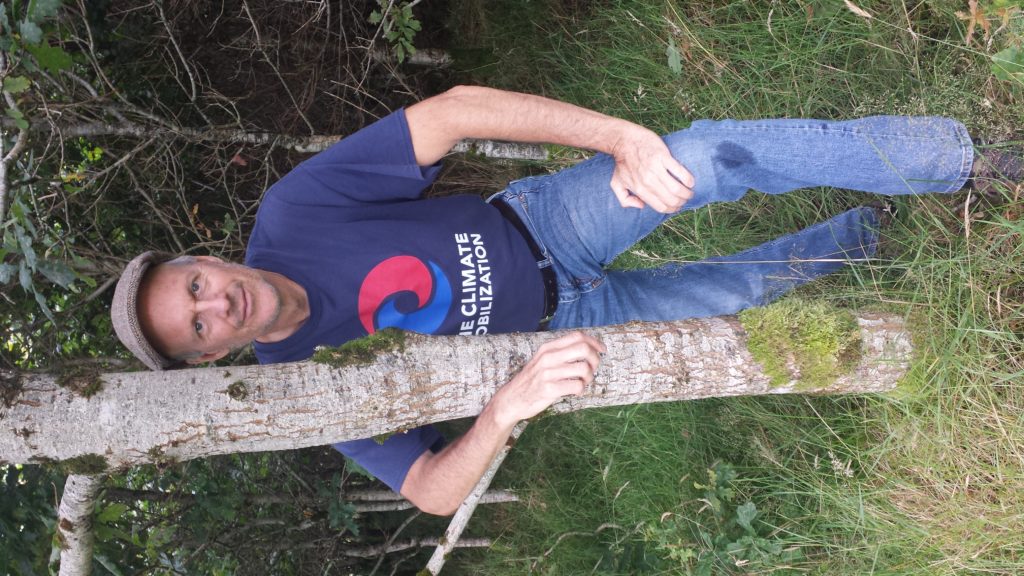Dear Friends,
Against popular opinion, the leadership of both major political parties seems hell-bent on building CO2 pipelines. This week, we talk with June Sekera about why this taxpayer-subsidized land grab is NOT a climate solution. We also discuss the right way to tackle carbon sequestration, including the newest high-tech gizmos known as … trees!
But first:

June Sekera
CONSTITUTIONAL CONVENTION. Given Congressional gridlock (when Republicans are in charge) and the enactment of half-measures to address urgent crises (when Democrats are in charge), at first blush the idea of sending power back to the states for a constitutional convention might sound like a winner. It’s not. In fact, such a convention could deliver a terminal blow to our already fragile democracy. Joining me for this discussion is Viki Harrison of Common Cause.
DON’T WATER YOUR LAWN. Lawn? What lawn? All Kathy and I see growing around our home is food. But if you have a lawn, consider watering it less, especially during the dog-days of August when grass naturally goes dormant. My guest, Mark Clipsham, argues that no lawn is an even better option, as he traces America’s obsession with green lawns back to King Henry VIII.
SPEAKING OF LAWNS… Kathy Byrnes and I discuss a Farm Bureau article that makes all kinds of bizarre statements en route to recommending chemicals as a way to avoid the tedium of maintaining a green lawn. The author’s comparison of lawn care to protecting crops with chemicals goes the extra mile in stretching the limits of logical thought. We push back.
CARBON SEQUESTRATION DONE RIGHT. My guest is June Sekera. She’s a public policy scholar and researcher whose most recent work focuses on carbon sequestration, including the discovery that subsidies for “mechanical” carbon removal emit more CO2 than they remove.
If you follow my blog, talk show, and podcast, you’re no doubt aware that CO2 pipelines are in the “wrong” category of carbon sequestration. As June points out, “such projects claim they will reduce CO2 emissions by 90 percent when in reality they capture as little as seven percent. In many cases, they actually increase CO2 emissions because of the extra energy required to power the machinery that captures and compresses the CO2. In addition, most of the CO2 currently captured is used for enhanced oil recovery, thereby defeating the purpose.”
The truth is there’s not a high-tech carbon-capture scheme that works, including the “Orca” direct-air carbon-capture plant in Iceland. That costly initiative — much heralded by businesses and governments — is prohibitively expensive, could take decades to operate at scale, and ironically was delayed due to poor weather conditions.
Oh, and the world would need eight million “Orcas” to accomplish the necessary CO2 removal!

Ed hanging out with one of several thousand oak trees thriving on his family’s farm in Ireland.
June says what is worth doing is biological sequestration – forest preservation, regenerative agriculture, and restoration of grasslands and wetlands. Each of these options merits its own conversation, but let’s start with trees — the option nearest and dearest to this Druid-descended Irish-American’s heart.
(I’m happy to tell you that my own personal efforts at planting trees have gone well. On eight acres of our family’s farm in Ireland, I enrolled in an EU program in 2000 that helped us plant 25,000 oak seedlings. Some are now twenty-feet tall, and the plantation is becoming a forest.)
After my inspiring conversation with June, I browsed around for further edification and found this interesting article in Science News: “Why planting tons of trees isn’t enough to solve climate change.”
The title of the article put me off. But upon reading it, the author, Carolyn Gramling, makes a lot of sense: “There’s too much focus on numbers of seedlings planted, and too little time spent on how to keep the trees alive in the long term.”
Gramling gives the example of China’s effort to fight the encroaching Gobi Desert. The Great Green Wall, as it’s called, involved “millions of seeds dropped from airplanes and millions more seedlings planted by hand” across an expanse of 2,800 miles. But up to 85 percent of the trees failed because they were non-native species that couldn’t survive in a desert.
Ouch. Here’s more ouch, this time in Turkey. In 2019, volunteers were organized to plant 11 million trees across the country. Three months later, 90 percent were dead from lack of water and because they were planted at the wrong time of year.
The message I get from this article and my conversation with June is that, yes, carbon sequestration might be the key to repairing the damage humanity has inflicted on Earth’s climate. But that sequestration must be biological, not mechanical, and trees must be a central part of the strategy.
I’ll wrap up with this quote from the article: “To have any hope of success, restoration projects need to consider the best times of year to plant seeds, which seeds to plant and where, who will care for the seedlings as they grow into trees, how that growth will be monitored, and how to balance the economic and environmental needs of people in developing countries where the trees might be planted.”
Thanks for reading, listening, and planting and caring for trees over the long haul! — Ed
*******
1. Constitutional convention a nefarious effort to destroy democracy, with Viki Harrison
2. CO2 removal that makes sense, with June Sekera
3. Don’t water your lawn, with Mark Clipsham
4. Farm Bureau article encourages backyard herbicide use, with Kathy Byrnes
– KHOI 89.1 FM (Ames, Iowa)
– KICI.LP 105.3 FM (Iowa City, Iowa)
– WHIV 102.3 FM (New Orleans, Louisiana)
– KPIP-LP, 94.7 FM (Fayette, Missouri)
– KCEI 90.1 FM (Taos, New Mexico)
– KRFP 90.3 FM (Moscow, Idaho)
– WGRN 94.1 FM (Columbus, Ohio)
– KKFI 90.1 FM (Kansas City, Missouri)
Please support the local businesses and non-profits who make this program possible. Click on their logos on the Fallon Forum website and in our weekly email, and visit Dr. Drake Family Psychiatry, Story County Veterinary Clinic, Bold Iowa, and Birds & Bees Urban Farm. Thanks for supporting the civil alternative to the shock jocks!

Ed Fallon

Hi, Ed! I have to say I agree with the whole thing, absolutely. The carbon sequest ideas won’t work, at least what we currently understand about technology. Yes, the focus on long life of many trees is the most effective, in some ways, but maybe it’s time simply to decide on new energy tech that doesn’t result in carbon emissions…we could do that, now, not by 2050…
A constitutional convention right now would simply kill what we have left, in part because of what ideology is in charge, and in part because there are very few people who actually understand what we were given to maintain in the first place, which means we are now headed down the same road as the Roman Empire, the Soviet Union, and Nazi Germany, and such a convention would simply seal the deal…keep up the fire, my friend!